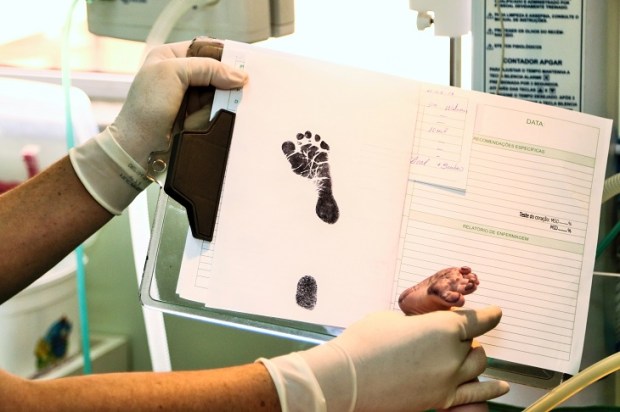The term ‘dystopian’ gets thrown around a lot these days, but it’s fair to say that the idea of babies gestating in a vat outside the womb warrants its use. Lab-grown babies are a feature of the dystopia imagined by Aldous Huxley in his 1932 novel Brave New World.
There is something unsettling about replacing one of nature’s most important and beautiful processes with soulless machinery, which is probably why a video showcasing the idea went viral recently. If you haven’t seen it, this process is as creepy as it sounds.
‘Ectolife’ is the name given to the concept by its creators. The video presents this as a scientific innovation that will make pregnancy safer and easier while claiming to be an improvement on the natural process because it allows scientists to fiddle and monitor.
Thankfully, this isn’t really happening. The video was apparently made by a self-proclaimed science communicator named Hashem Al-Ghaili to promote a hypothetical possibility.
Although Ectolife might be an intentionally controversial choice of video to amass views, it does raise genuine questions about the lengths humanity is willing to go in the name of scientific progress.
Would our society accept this sort of technology, or would many view it as science going too far? Are we concerned about meddling with nature and playing God, or are we supremely confident in our ability to manipulate all things, down to the embryonic level? What would the state do with such technology if it were available? These are questions that need to be addressed sooner rather than later.
There are several observations that can be made of Al-Ghaili’s video.
First, the babies depicted growing in artificial wombs are clearly, well, babies – unborn human beings. There are no references to ‘clumps of cells’ as it is assumed that these vats contain authentic human life. However, the video suggests that one benefit of using Ectolife would be the ability to monitor a baby’s development for ‘defects’ via a phone app. Given that the West enshrines abortion as an axiomatic right, it would not be too difficult to envisage a future where humans are grown in factory vats and ‘defective’ babies are dispassionately destroyed. In Huxley’s Brave New World, babies were also grown in artificial wombs, but the term ‘defective’ was assigned to the lower castes. In our world, we kill them before they’re born.
Second, the main selling point of Ectolife is its convenience. After all, the mother (or ‘birthing person’ – it’s 2023!) no longer needs to fuss about rest, diet, taking time off work, or the pain of giving birth – she can monitor her baby’s progress on her iPhone. Pregnancy would be like having a Tamagotchi, except malfunctions result in actual death.
How far are we willing to go for the sake of convenience? Are we willing to sacrifice the mysterious and sacred bond formed between mother and child in the womb to save a little money or forgo nausea? Can we comprehend the importance of the months a child spends in the womb, or are we confident in our ability to simulate the entire process? One wonders if this is a risk worth taking.
Third, we have great literary examples of men creating catastrophes in their manic pursuit of utopia, especially when their science defies the boundaries of human nature – Mary Shelley’s Frankenstein being the classic example. Frankenstein, in some sense, is a retelling of Babel where man’s hubris results in divine judgment. In Shelley’s novel, the obsessed scientist Victor Frankenstein seeks to create, and thereby master, life. He subsequently creates a monster who defies him. It’s a sobering reflection on the terrible and unforeseen consequences of science without morality. Frankenstein was first published in 1818 at the height of the Industrial Revolution when man’s relationship to science, economics, and the powers that be was being transformed.
Although Ectolife is just an idea, we also live in such times.
I’m sure there are those who believe that ‘lab-grown babies’, to use Al-Ghaili’s phrase, would be preferable to nature’s method, given all the neat tricks scientists could do by injecting the right fluids at the right moments, and so on. They would enthusiastically promote the benefits of constantly monitoring every heartbeat and movement and see no essential difference between a real mother’s womb and a simulation. We should not listen to such people. Their spiritual and emotional senses are dimmed. Unfortunately, the people who seek to medicalise and micro-manage everything are also the people who rule us.
Many Westerners have become largely detached from the moral principles that once served as an anchor for civilisation. We’ve severed the cords that tied us to a transcendent, objective, moral truth beyond our own capacity for technological progress, and we take it for granted that we can easily reach an arbitrary moral consensus. The truth is that we are not mere matter, and the bond forged between mother and child in the womb cannot be replicated in a machine. Will this truth be recognised in years to come?
Technological innovations such as Ectolife are always promoted by pointing out the problems they would solve. In this case, growing a baby outside of the womb is presented as a safe, convenient, and viable option for women who can’t conceive or don’t want to endure the inconvenience of pregnancy. One can see the appeal for those who cannot naturally have children. Al-Ghaili’s video even states that Ectolife is ‘powered entirely by renewable energy’. The utopian propaganda is one thing, but reality is another. The state would promote this dystopian vision over natural conception and convince young women that pregnancy is unsafe. It would be the final frontier of the state interfering with the nuclear family – a state that grows your baby for you.
The Ectolife video is most likely pushing the envelope for controversy’s sake. One hopes this is the case, but Huxley’s vision of the future may be nearer than we realise.

























